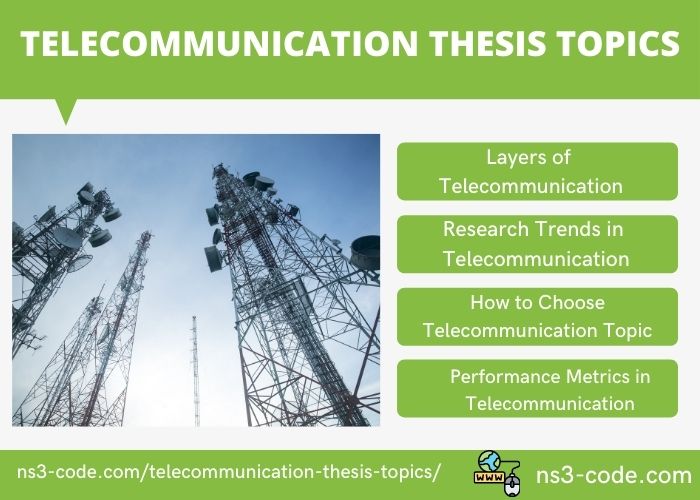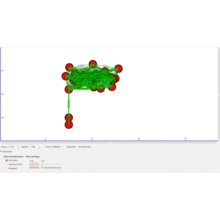To support long-distance communication, telecommunication technology was designed and practically applied through electromagnetic waves / electric signals. At the beginning of telecommunication technologies, it utilizes signal flags, smoke signals, visual signals, semaphore telegraphs, etc. In particular, it utilizes microwaves, radio waves, the internet, telephone medium, a communication satellite, fiber optics, etc. for electromagnetic and electrical telecommunication technologies.
This page is exactly intended to give you up-to-the-minute telecommunication thesis topics along with interesting research areas!!!

Important Components of Telecommunication
In general, the fundamental telecommunication model is made up of the following three significant components. In addition to these components, other entities may include improving the efficiency of the system which majorly depends on project needs.
- Transmitter – It collects the data and transforms it into analog / digital signals based on the requirement
- Transmission medium – It transmits the data/signal to the physical channel or wireless channel
- Receiver – It is the reversible process of the transmitter. It collects the signal from the transmission medium and transforms it back to the original data
If the telecommunication system uses a single dedicated channel among transmitter and receiver for data transmission then it is called point-to-point communication. Similarly, if the telecommunication system establishes communication channels among one transmitter and more low-powered receivers for radio communication, then it is called broadcast communication.
Further, if the telecommunications system uses a physical channel for more number transmitters and receivers for data sharing then it is called a multiplex system. Here, the multiplex signals are moved at nodes for the appropriate receiver (destination). Moreover, it has the main advantage of high-cost reduction for deployment. Below, we have given you the primary layers incorporated in telecommunication systems.
Layers for Telecommunication
- Layer 1 – User Equipment Layer
- For instance: User premises equipment, transmit devices, switches, etc.
- Layer 2 – Network Communication Layer
- For instance: Circuit-switched network
- Layer 3 – Service Layer
- For instance: 0800 services, voice, fax, etc.
To the continuation of layers, now we can see the primary techniques involved in developing telecommunication models. These techniques are globally popular in telecommunication systems. Further, we also support you to develop your techniques (algorithm / pseudo-code for telecommunication thesis topics) to untie the complex knots in code development.
Major Techniques for Telecommunication
- Digital Modulation
- Phase Shift Keying
- Frequency Shift Keying
- Amplitude Shift Keying
- Analog Modulation
- Frequency Modulation
- Phase Modulation
- Amplitude Modulation
In recent days, the revolution of the telecom industry is incredible ranges from plain voice messaging to sophisticated multimedia service regardless of complexity. Nowadays, nearly 5+ billion people are using smartphones. In order to meet the expectation of high storage, high bandwidth, low cost of processing power, etc. it enforces to create advanced technologies. Below, we have given you some latest research trends in telecommunication.
Research Trends in Telecommunication
- Telco Mobility (For instance: smart apps, smart phones, etc.)
- Convergence (For instance: Triple Play, VoIP, Quad Play, etc.)
- Terminal-User Mobility (For instance: location-based services)
- Social Networking (For instance: social media websites, etc.)
- Free Space Optics and Signals (For instance: fading channels)
- 5G enabled Cloud Services (For instances: KaaS, PaaS, SaaS, IaaS, etc.)
- Machine-to-Machine communications (For instance: manufacturing, vehicular sectors, smart logistics, healthcare, etc.)
- Trustable Drone Communication (For instance: disaster monitoring, goods delivery, etc.)
- Enterprise Mobility (For instance: smart logistics, field based sales enforcement, etc.)
- Advance Cellular Communication Technologies
- Li-Fi and Wi-Fi
- Terahertz (THz) Communication
- 5G beyond and 6G
- Intelligent Small Antennas Design
- Optical and Cognitive Radio Communication
- Millimeter Wave (mmWave) technology
- Enhanced Signal Detection and Modulation schemes
How to Choose Telecommunication Thesis Topics?
So far, we have discussed the telecommunication basics, components, layers, techniques, and recent trends. Now, we can see how effectively we can select the thesis topics. Generally, master’s programs are next-level undergraduate programs. The main of the master’s program is to make your expertise and gain more skills in your interested area like telecommunication. Consequently, it teaches you more than your undergraduate subject knowledge.
In undergraduate project work, you can gain knowledge on basics and provide you different range of job opportunities. In master’s program, it makes you specialize in a particular field of study. So, it increases the job opportunities in your interested field. Also, it makes you create your own contribution to social development in the form of research. As are a result, it will create the add-on status of your professional profile.
Similar to thesis selection, thesis submission is also very important in master’s programs. Since it helps to present your efforts and time on achieving a master’s degree. The telecommunication thesis topics you are choosing for your project will have significant importance in creating the best impression of your thesis in front of your job interviewer. Therefore, keep the following points in mind while selecting a good thesis topic on telecommunication for your master’s program.
Select a topic that is easy to complete fast
Select a topic that is easy to complete fast
- The master thesis is the test for your competency in your interested subject area
- So, make sure that your handpicked topic is handpicked from your interested area
- Also, validate the selected topic for freshness and uniqueness
- Check the future scope of the topic for further study
Confirm the concept for topic
- Analyze the recent issues and challenges in your interested area
- Perform a detailed survey on the previous study related to the topic
- Narrow down the topic after an in-depth examination
- Finalize the concept for your topic (i.e., what you trying to focus on in research)
Develop the project with passion
- Select appropriate research solution and development tool
- Fill with excitement to practically implement handpicked topic
- Analyze the experimental results through different parameters
- Prepare the master thesis in a structured format
Hope now you are familiar with thesis topic selection till the thesis submission. Our resource team will help you in all these phases to complete your research on time. We have individual teams for research, development, and thesis. So, it will be more useful for you to avail yourself of the research services in one place like us to formulate telecommunication topics. Further, we have also included a few 5G enabling technologies for the best telecommunication thesis topics for your benefit.
- Massive MIMO
- Big Data Analytics
- Mobile Cloud Computing
- Green IoT-Communications
- Network Ultra-Densification
- Millimetre Wave (mmWave)
- Scalable Internet Of Things (IoT)
- Network Function Virtualization (NFV)
- New Radio (NR) Access Techniques
- Wireless Software-Defined Network (SDN)
- Device-To-Device Communication with High Mobility
Research Telecommunication Projects
Due to the vast scientific advancements, wireless communication has become more popular among individual and business sectors. In specific, Cognitive Radio, UWB and 5G NS3 have gained more attention among the research community. Additionally, it also includes some technical challenges to developing or deploying real-world applications. And, some of the research-oriented problems are highlighted as follows,
- Modeling of ZIF receivers at the high spectrum
- Multiple Radio Frequency bands Co-existence
- External of internal interference in communication
- Inaccessibility of network components or data
- Modeling of radio transmitter and receivers in extensive bands
Our research team has collected numerous research ideas for solving the above-specified issues. Further, we also like to share other forward-thinking technologies that currently we are working for our handhold research scholars. Beyond the below list of technologies, we have also gathered other innovative communication research ideas and telecommunication thesis topics. These ideas surely present you with the new dimension of telecommunication.

What are the interesting topics in Telecommunication?
- Enhanced Multiuser MIMO (M-MIMO) Communication Techniques
- Adaptive Wireless Networking and Channel Coding
- Efficient Spectrum Sharing in Cognitive Radio Networks (CRN)
- Designing Energy-Aware Internet Routers for Efficient Transmission
- Improved Network Modeling for Controlling Environmental Pollution
- Remote Patient Health Monitoring in Wireless Body-Area Networks
- Wireless Heterogeneous Communication in 5G-IoT Networks
- Design of Aerial base station and Mission-aware path in UAV Systems
- Accurate Visible light Positioning System
- Employment of Machine Learning Algorithms in VLC-based Applications
Performance Metrics in Telecommunication
Now, we can see the evaluation of developed models for analyzing network performance and the quality of services. On the one hand, network performance is measured through different standardized networking/simulation parameters. For instance: broadcast latency, jitter (delay variation), bit error rate, computing time, etc. On the other hand, quality of service is nothing but excellence of service that user receives at destination point and also it checks whether the received quality is same with original produced quality.
What is QoS in telecommunication?
As mentioned earlier, QOS plays a major role in measuring the whole service performance which the network users specifically receive. For instance: cloud-oriented services, network services, telephony, etc.
At present, several technologies are widely along with telecommunications such as deep learning, artificial intelligence, machine learning, 6G networks, full-duplex communication, spectrum utilization, free-space optical communication, etc. All these technologies are essential to meet the required QoS. And, some of the performance metrics that have high possibilities to influence the QoS are given as follows,
- Complexity
- Network lifespan
- Bit Error Rate
- Energy Utilization
- Cost
- Energy-spectral efficiency
- Fault Tolerance
On the whole, we provide you best research, code development, and thesis writing services for any sort of telecommunication thesis topics. Further, if you are interested to know more exciting research perspectives of telecommunication, we are ready to support you in all means of the latest research advancements.

 Click Here to watch our latest output video using NS3 simulator
Click Here to watch our latest output video using NS3 simulator  Click Here to watch our latest projects screenshots using NS3 simulator
Click Here to watch our latest projects screenshots using NS3 simulator